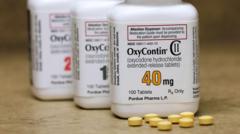In a monumental development, Purdue Pharma and the Sackler family have settled claims related to the infamous opioid painkiller OxyContin with a staggering payment agreement of up to $7.4 billion. This current settlement sees an increase of over $1 billion compared to the previously rejected $6 billion agreement by the U.S. Supreme Court last year. The settlement is comprised of $6.5 billion to be paid by the Sackler family and an additional $900 million from Purdue.
Purdue Pharma and Sackler Family Reach Historic $7.4 Billion Opioid Settlement

Purdue Pharma and Sackler Family Reach Historic $7.4 Billion Opioid Settlement
Purdue Pharma, alongside the Sackler family, has agreed to a significant financial settlement aimed at addressing the opioid crisis in the U.S.
The opioid epidemic, fueled by the widespread prescription and abuse of OxyContin, has led to countless addiction cases and fatalities across America, prompting numerous lawsuits against pharmaceutical companies. The New York Attorney General’s office indicated that the funds from this agreement will be allocated towards opioid addiction treatment and prevention services nationwide. Purdue commented that the settlement will aid in compensating victims and delivering lifesaving treatment and overdose rescue medicines.
While the deal is lauded as one of the largest in the battle for accountability in the ongoing opioid crisis, it awaits court approval, and specifics of the agreement are still being finalized. Under the previous agreement, the Sackler family would have gained immunity from future lawsuits, a condition that has not been mentioned in the current negotiations. Connecticut Attorney General William Tong expressed optimism regarding the settlement, asserting it would bring a sense of closure to those affected by the crisis.
The Sackler family is accused of being mindful of the legal repercussions of their actions while extracting over $11 billion from Purdue before its bankruptcy, complicating the recovery of these funds. This settlement could mark a pivotal moment in finding accountability within the pharmaceutical industry as communities across the U.S. continue to grapple with the aftermath of the opioid crisis.
Kara Trainor, a recovery advocate familiar with the implications of OxyContin, highlighted the personal scars left by Purdue's practices, stating that the company prioritized profits over human lives. As discussions advance towards an eventual court approval, the focus remains on how these funds can truly impact the lives of those affected by addiction and restore hope in a community ravaged by the opioid epidemic.
While the deal is lauded as one of the largest in the battle for accountability in the ongoing opioid crisis, it awaits court approval, and specifics of the agreement are still being finalized. Under the previous agreement, the Sackler family would have gained immunity from future lawsuits, a condition that has not been mentioned in the current negotiations. Connecticut Attorney General William Tong expressed optimism regarding the settlement, asserting it would bring a sense of closure to those affected by the crisis.
The Sackler family is accused of being mindful of the legal repercussions of their actions while extracting over $11 billion from Purdue before its bankruptcy, complicating the recovery of these funds. This settlement could mark a pivotal moment in finding accountability within the pharmaceutical industry as communities across the U.S. continue to grapple with the aftermath of the opioid crisis.
Kara Trainor, a recovery advocate familiar with the implications of OxyContin, highlighted the personal scars left by Purdue's practices, stating that the company prioritized profits over human lives. As discussions advance towards an eventual court approval, the focus remains on how these funds can truly impact the lives of those affected by addiction and restore hope in a community ravaged by the opioid epidemic.






















